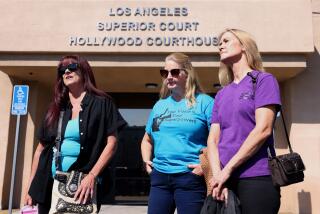Sex Offenders Not Welcome, Neighbors Say
Many residents in the southwest L.A. neighborhood where the Rochester House is located knew the historic white mansion was home to numerous men.
Last month, they learned that the private sober-living facility on Rochester Circle houses more than two dozen registered sex offenders, despite a state law that appears to limit that number to six. Now, residents want the men moved out.
For the record:
12:00 a.m. April 6, 2005 For The Record
Los Angeles Times Wednesday April 06, 2005 Home Edition Main News Part A Page 2 National Desk 2 inches; 84 words Type of Material: Correction
Sex offenders -- A map in Friday’s California section showed the approximate location of registered sex offenders living in the Jefferson Park area of Los Angeles. Of the two sources listed for the map, Los Angeles County’s Megan’s Law website, upon which the drawing was based, updates its information on a monthly basis. The California Department of Justice website updates its map daily and is thus a more timely resource. Some locations shown on the map may no longer appear on the state’s website.
“I think it’s a shame that they would put something like that in a community and not let the residents know that kind of activity is going on,” said Ed Jones, a 10-year resident of the neighborhood near Jefferson Boulevard and Western Avenue. “They need to get rid of that activity in a residential area and move it into a commercial or industrial zone.”
The computerized state registry for sex offenders, created by Megan’s Law, shows 25 registered offenders reported the Rochester House as their address, according to a review by The Times. Elected officials say as many as 31 may be living there.
The house, however, appears to fall under a loophole in state law, according to the state Department of Corrections. Sober-living facilities that don’t include medical treatment, such as Rochester House, apparently are not subject to the six-person cap, said Ivory Roberts, the Department of Corrections’ assistant regional administrator for Los Angeles County. Moreover, sober-living facilities are not subject to state regulation and do not require licenses, he said.
“We had our legal department render an interpretation, and our legal department interprets [the statute] very broadly,” Roberts said.
A recent inspection of the residence revealed no violations of state laws, so the department considers the matter closed, he said.
Even if the corrections department placed only six parolees in a facility, other agencies are not precluded from sending registered sex offenders there as well, significantly increasing the number of people who may potentially live in one residence, said Margot Bach, a spokeswoman for the corrections department.
Frightened neighbors and city and state officials, however, say they want many of the offenders at Rochester House relocated. They plan a protest at 5 p.m. today.
“Legal or not, you cannot convince me, nor can you convince my constituents, that this is reasonable,” said Assemblyman Mark Ridley-Thomas, whose district includes the neighborhood. “Such facilities are merely exploiting the lack of reasonable regulation and oversight.”
Ridley-Thomas is drafting legislation that would limit the number of sex offenders at recovery facilities, create a regulatory authority to oversee them, and require a state license.
“If these facilities are going to be permitted, the question is under what conditions?” Ridley-Thomas said.
City Councilman Bernard C. Parks, in whose district Rochester House is located, has asked the city attorney’s office to interpret the penal code. The city’s Building and Safety and Planning departments also are trying to determine if city ordinances can be used to reduce the number of occupants.
“The general public would say we want zero” registered sex offenders in our community, Parks said. More than 100 residents met with state and local officials last month, outraged that they weren’t informed about the residents of Rochester House, whose convictions include lewd and lascivious acts with a child under 14, and rape.
Rochester House is a white, two-story mansion once owned by comedian Eddie Anderson, who played Jack Benny’s sidekick “Rochester” and appeared in numerous movies. The sober-living facility is operated by his son, Eddie Anderson, who could not be reached for comment.
As for this evening’s planned rally in front of the house, Parks and Ridley-Thomas said they support alerting residents to the presence of sex offenders, but cautioned against inflaming community passions.
“The last thing we need is for anyone to feel as though they’re going to take this issue into their own hands and deal with it in an illegal manner,” Parks said.
Najee Ali, one of the protest organizers, said he hopes the demonstration will serve two purposes: alerting area residents and sending a message to the sex offenders living at the home.
“Our goal is not to antagonize them, but to create awareness for the community,” he said. “I’m hoping the sex offenders will realize that they’re being watched now and they’re under scrutiny by the entire neighborhood and won’t be tempted to harm a child...
“Clearly, these people have the right to have a place to live, but certainly I don’t feel that right extends to our schools and parks where children are at risk,” he added.
Ridley-Thomas’ office is organizing another community meeting scheduled for April 7.
More to Read
Sign up for Essential California
The most important California stories and recommendations in your inbox every morning.
You may occasionally receive promotional content from the Los Angeles Times.










